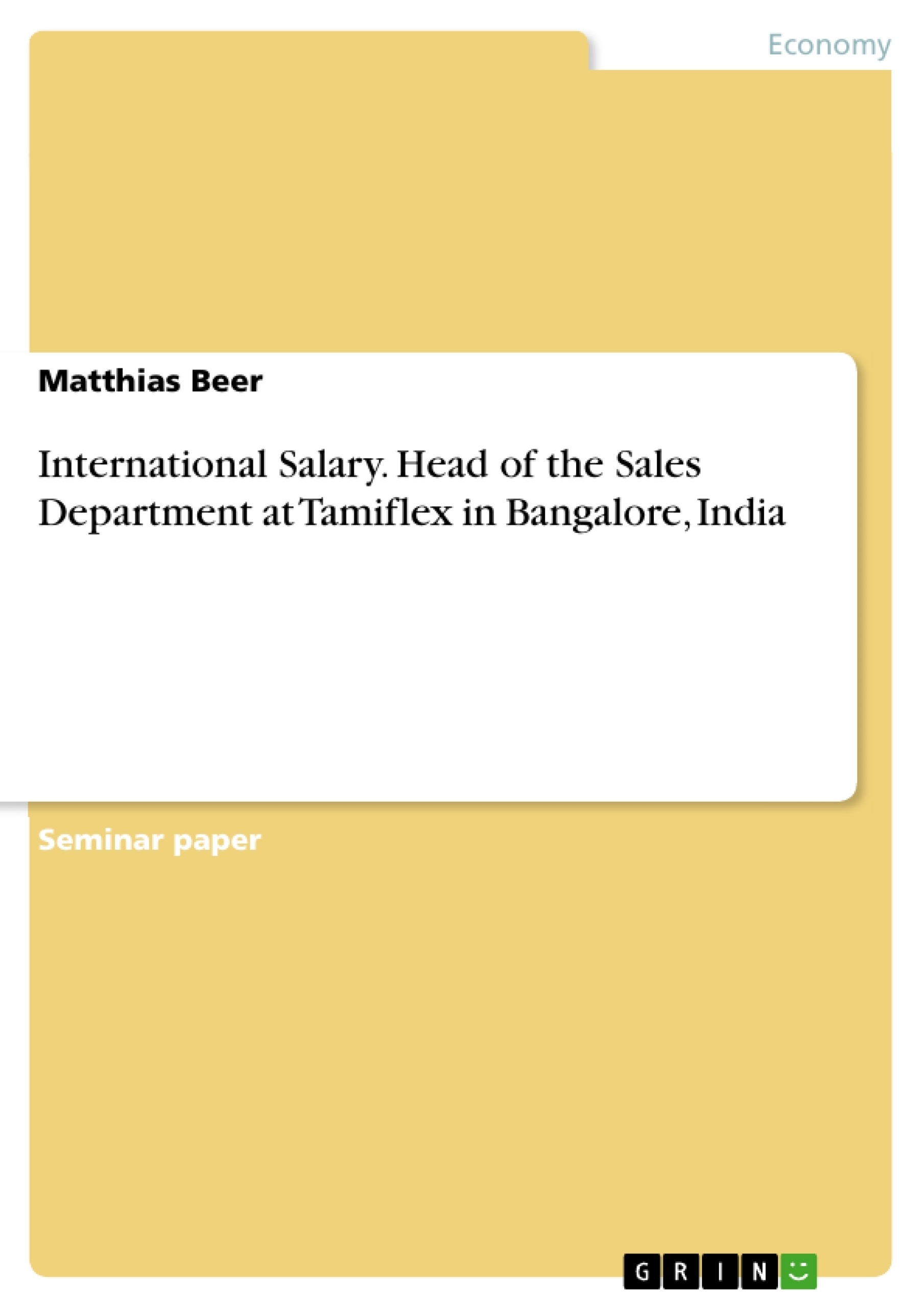The objective of this paper is to provide John Maynard, head of the human resource department of Tamiflex, with a sound recommendation whether he should accept Marit Iyang’s application for the position as the head of the new sales department in Bangalore, India. Iyang, born in India and currently working as a sales manager in the company’s German headquarter, is highly qualified for the job due to her MBA-degree and three years of working experience as an expatriate in a sales office in China. Marit Iyang’s possible compensation as an expatriate manager in Bangalore is calculated using the balance sheet approach and considering the COLA index. In contrast the salary of a local sales manager with comparable qualifications is evaluated with an empirical, self-made survey. While Iyang’s compensation consisting of a base salary, cost of living allowance, overseas service premium, hardship allowance and housing allowance would add up to EUR 129,312, the total annual costs for a local sales manager would not exceed EUR 15,000. Thus the labor costs for Iyang are significantly higher but the company would benefit from her local background as well as from her working experience in the headquarter of Tamiflex. Marit Iyang should definitely be assigned as the head of the sales department in Bangalore, India.
Table of Contents
- Executive Summary
- List of Abbreviations.
- List of Tables & Figures......
- Introduction
- International Compensation...
- The Balance Sheet Approach ......
- Expatriate Sales Manager Salary in Bangalore, India
- Local Compensation.....
- Advantages and Drawbacks of Hiring a Local vs. Expatriate Manager..
- International Staffing Policies.
- Ethnocentric vs. Polycentric Staffing for the New Sales Manager Position at Tamiflex's Branch in India.........
- Conclusion........
- ITM Checklist........
- Bibliography.....
Objectives and Key Themes
This paper aims to provide John Maynard, head of human resources at Tamiflex, with a well-informed recommendation on whether to accept Marit Iyang's application for the position of head of the new sales department in Bangalore, India. Iyang, a qualified candidate with an MBA and previous experience in a sales office in China, presents a compelling case for the role. The paper analyzes the potential compensation for both Iyang, as an expatriate, and a local sales manager, considering factors such as cost of living and experience.
- International Compensation and its Impact on Hiring Decisions
- Comparing the Compensation Packages for Expatriates and Local Employees
- Analyzing the Benefits and Drawbacks of Hiring Local vs. Expatriate Managers
- Exploring the Role of International Staffing Policies in Multinational Companies
- Evaluating the Suitability of Different Staffing Strategies for Tamiflex's New Branch in India
Chapter Summaries
The Introduction provides background information on the case study, focusing on Tamiflex's expansion into India and the need to appoint a new head of the sales department. It highlights the candidacy of Marit Iyang, a highly qualified individual with relevant experience. The chapter sets the stage for the analysis of Iyang's compensation package and the evaluation of her suitability for the role.
The chapter on International Compensation delves into the methods used to calculate the compensation for expatriates. The Balance Sheet Approach, a widely used method, is discussed in detail, with a particular focus on its application to the case of Marit Iyang. The chapter further explores the factors that influence the compensation of expatriate sales managers in Bangalore, India.
The chapter on Local Compensation provides a detailed analysis of the salary range for local sales managers in Bangalore, India. It highlights the differences between the salary structures for expatriates and local employees, setting the stage for a comparative analysis in the following chapters.
The chapter on Advantages and Drawbacks of Hiring a Local vs. Expatriate Manager examines the pros and cons of each approach. It explores the benefits of hiring local employees, such as lower costs and cultural knowledge, as well as the advantages of hiring expatriate managers, such as global experience and leadership skills. The chapter also discusses international staffing policies and the implications of ethnocentric vs. polycentric staffing strategies for Tamiflex's new branch in India.
Keywords
The key concepts and themes explored in this paper include international compensation, expatriate management, cost of living allowance, staffing policies, ethnocentric vs. polycentric staffing, and the advantages and drawbacks of hiring local vs. expatriate managers.
Frequently Asked Questions
What is the Balance Sheet Approach in international compensation?
It is a method used to calculate expatriate salary by ensuring the employee maintains the same purchasing power as in their home country, plus additional allowances.
How much does an expatriate sales manager cost in Bangalore?
According to the paper's calculation for Marit Iyang, the total compensation adds up to approximately EUR 129,312 per year.
What is the cost of hiring a local sales manager in India?
The study finds that the annual cost for a local sales manager with comparable qualifications would not exceed EUR 15,000.
What are the advantages of hiring an expatriate like Marit Iyang?
The company benefits from her experience at the German headquarters, her MBA degree, and her familiarity with both the home and host country cultures.
What is the difference between ethnocentric and polycentric staffing?
Ethnocentric staffing focuses on home-country nationals for key positions, while polycentric staffing prioritizes local host-country nationals.
- Quote paper
- Dipl. Ing. MBA Matthias Beer (Author), 2011, International Salary. Head of the Sales Department at Tamiflex in Bangalore, India, Munich, GRIN Verlag, https://www.grin.com/document/262135



